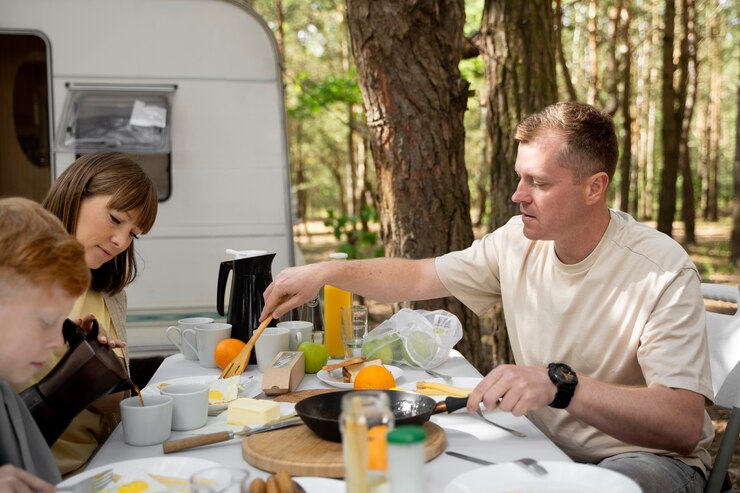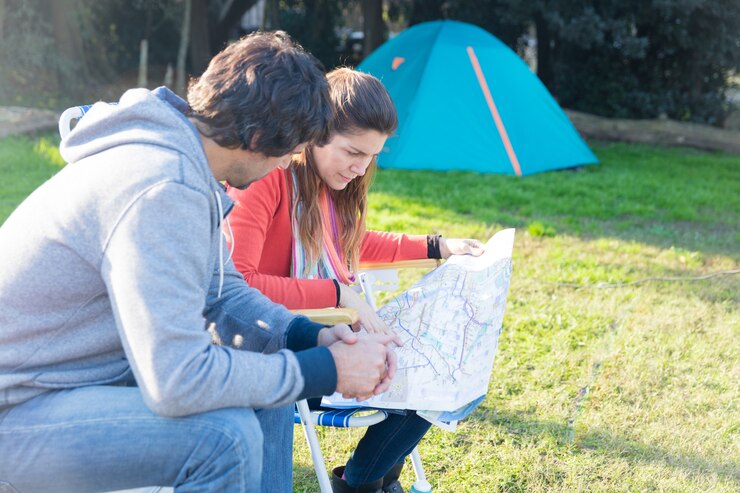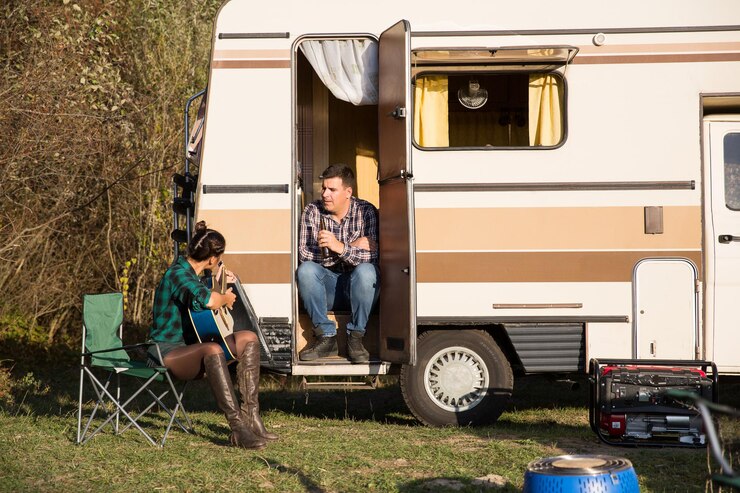Long-term RV camping has become a lifestyle choice for many, offering a perfect balance between adventure and comfort. For those considering a shift from weekend trips to an extended, nomadic experience, it’s a chance to explore new places, meet diverse people, and live with flexibility. In this guide, we’ll cover everything you need to know about long-term RV camping—from practical tips to the perks of life on the road.

Why Choose Long-Term RV Camping?
Long-term RV camping is more than just a vacation; it’s a lifestyle. Here’s what draws people to it:
• Freedom and Flexibility
Unlike traditional homes or apartments, an RV allows you to move wherever your heart desires, without the constraints of leases or long-term commitments.
• Closer Connection to Nature
Living in an RV brings you closer to nature’s wonders. Whether it’s the quiet beauty of a forest, the sound of ocean waves, or the sight of mountain peaks, every morning promises a new view.
• Affordable Living
Long-term RVing can be more affordable than traditional living, especially for those looking to downsize. With careful budgeting, you can control costs by staying in free or low-cost campsites and cooking your own meals.
• Minimalist Lifestyle
RV living encourages a simpler life, with fewer belongings and less clutter. This shift can lead to a more mindful lifestyle focused on experiences over things.

Choosing the Right RV for Long-Term Camping
RV living encourages a simpler life, with fewer belongings and less clutter. This shift can lead to a more mindful lifestyle focused on experiences over things.
• Class A Motorhomes
These large RVs offer space and amenities similar to a small apartment, making them ideal for families or those wanting more comfort.
• Class B and C Motorhomes
These are more compact but still provide essential facilities. They’re easier to drive and often more affordable than Class A motorhomes.
• Fifth Wheels and Travel Trailers
If you already own a powerful truck, a trailer or fifth wheel can offer ample living space and flexibility.
When choosing an RV, consider how much room you’ll need, your budget, and how often you’ll be moving between campsites. Remember, a larger RV can offer more comfort but might limit the places you can easily park or camp.
Finding Ideal Long-Term Campsites
Finding the right spot to park your RV for extended stays is essential for a successful long-term camping experience. Here are some popular options:

• Private RV Parks and Campgrounds
Many private RV parks offer long-term stays, sometimes with amenities like Wi-Fi, laundry, and community areas. They can be more expensive but provide stability and convenience.
• Public Lands (BLM and National Forests)
In the U.S., public lands managed by the Bureau of Land Management (BLM) and national forests often allow long-term camping for a fraction of the price of private parks. These areas offer beautiful surroundings but may lack amenities.
• State Parks and National Parks
While some state and national parks allow extended stays, they usually have a maximum limit. Check local regulations before setting up for the long term.
• Boondocking and Dispersed Camping
For the more adventurous, boondocking (camping without hookups) is a way to stay in remote areas for free or a low cost. It requires self-sufficiency with water, power, and waste management, but the rewards include solitude and scenic landscapes.
Essential Tips for Long-Term RV Camping
Living in an RV requires adaptability and a few lifestyle adjustments. Here are some tips to make long-term RV camping easier:

• Plan Your Route but Be Flexible
While it’s great to have a route in mind, long-term RVing is about flexibility. Weather changes, road conditions, and campground availability can all affect your plans. Be prepared to adapt when necessary.
• Create a Routine
Long-term camping can feel chaotic without a routine. Setting a daily schedule helps create a sense of stability, whether it’s for work, cooking, or exercise.
• Maintain Your RV Regularly
Routine maintenance is crucial for long-term RVers. Regularly check your tires, fluids, and brakes. Clean your water tanks, check for leaks, and monitor battery levels to avoid surprises on the road.
• Stay Connected
For many, internet access is essential, especially for remote workers. Consider investing in a mobile hotspot or a Wi-Fi extender to stay connected, even in remote locations.
• Manage Finances Carefully
Track your expenses and stick to a budget. Consider buying groceries in bulk, cooking your meals, and opting for free campsites when possible.
• Embrace Minimalism
Space is limited in an RV, so avoid clutter. Choose multi-functional items, and focus on necessities over luxuries.

Common Challenges of Long-Term RV Camping (and How to Handle Them)
While RV life can be rewarding, it comes with its own set of challenges:
• Limited Space
Living in an RV means sharing close quarters. Respect each other’s personal space and establish boundaries when needed.
• Weather Extremes
RVs can be hot in summer and cold in winter. Insulate your RV, invest in a space heater, and consider a fan or AC unit for climate control.
• Maintenance Needs
RVs require regular upkeep. Set aside a budget and time for maintenance tasks, and learn basic repairs to handle minor issues yourself.
• Waste Management
Properly managing water, gray water, and black water tanks is essential. Learn about dump stations in the areas you’re visiting and maintain your tanks to avoid odors.
Embracing the RV Lifestyle: Is It for You?
Long-term RV camping isn’t for everyone, but for those with a love of travel and adventure, it can be the ultimate freedom. The chance to wake up in a new location, meet other travelers, and experience the world on your terms is a unique experience. Embrace the flexibility, stay open to the unexpected, and let every day be an exploration.
FAQs
The cost varies widely depending on your travel style, campsite fees, fuel, food, and entertainment. On average, monthly costs can range from $1,000 to $3,000, with boondocking (free camping) and cooking at home helping reduce expenses.
Yes, many people live in their RVs year-round. However, you need to be prepared for seasonal challenges, such as heating during the winter and cooling in the summer. Insulation, climate control, and strategic route planning can make year-round RVing comfortable.
Options include private RV parks, campgrounds, state parks, and public lands. Each has different stay limits and amenities, so it’s important to check regulations and availability before setting up for an extended stay.
You can use mobile hotspots, Wi-Fi extenders, or satellite internet. Many RVers invest in data plans with good coverage, especially if they work remotely, as cell service can be limited in some areas.
Yes, boondocking can be safe, especially if you research your locations and follow standard safety practices, such as locking doors, staying aware of your surroundings, and letting someone know your plans.
Most RVs have gray and black water tanks. Familiarize yourself with local dump stations and always empty your tanks responsibly. Many RV parks and campgrounds have facilities for this, or you can use a portable waste tank to transport waste if necessary.
Embrace minimalism and use storage solutions like bins, collapsible items, and multi-purpose furniture. Regularly declutter and only bring essentials to avoid overcrowding your space.
Yes, many RVers travel internationally, especially between the U.S., Canada, and Mexico. However, you’ll need to research border-crossing requirements, insurance coverage, and regulations regarding your vehicle in each country.
